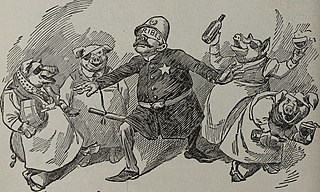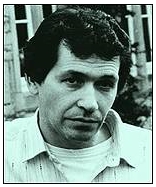The Flying Squad is a branch of the Serious and Organised Crime Command within London's Metropolitan Police Service. It is also known as the Robbery Squad, Specialist Crime Directorate 7, SC&O7 and SO7. It is nicknamed The Sweeney, an abbreviation of the Cockney rhyming slang "Sweeney Todd".

Stephen Lawrence was a black British 18-year-old from Plumstead, southeast London, who was murdered in a racially motivated attack while waiting for a bus in Well Hall Road, Eltham, on the evening of 22 April 1993. The case became a cause célèbre: its fallout included changes of attitudes on racism and the police, and to the law and police practice. It also led to the partial revocation of the rule against double jeopardy. Two of the perpetrators were convicted of murder on 3 January 2012.

The Serious Organised Crime Agency (SOCA) was a non-departmental public body of the Government of the United Kingdom which existed from 1 April 2006 until 7 October 2013. SOCA was a national law enforcement agency with Home Office sponsorship, established as a body corporate under Section 1 of the Serious Organised Crime and Police Act 2005. It operated within the United Kingdom and collaborated with many foreign law enforcement and intelligence agencies.

Police corruption is a form of police misconduct in which law enforcement officers end up breaking their political contract and abusing their power for personal gain. This type of corruption may involve one or a group of officers. Internal police corruption is a challenge to public trust, cohesion of departmental policies, human rights and legal violations involving serious consequences. Police corruption can take many forms, such as: bribery, theft, sexual assault, and discrimination.
Anthony Raymond Lauer, was an Australian police officer who served as the Commissioner of the New South Wales Police from 1991 until 1996. In February 1996, Lauer's term ended in controversy with his resignation soon after the start of the Wood Royal Commission into police corruption.
Operation Countryman was an investigation into police corruption in London in the late 1970s. The operation was conducted between 1978 and 1982 at a total cost of £3 million and led to eight police officers being prosecuted, although none were convicted. The initial allegations of corruption were made by a supergrass who claimed that some officers, including members of the elite Flying Squad which dealt with commercial armed robberies, were receiving bribes from criminals in return for warnings of imminent police raids or arrests, the fabrication of evidence against innocent men, and having charges against guilty criminals dropped.
John Yates is a former Assistant Commissioner in the London Metropolitan Police Service (2006–2011). As leader of the Metropolitan Police Service (MPS)'s Special Inquiry Squad, Yates was dubbed "Yates of the Yard" by the British press following his involvement in a number of cases with high media profiles. Yates came to particular prominence for heading the Cash for Honours investigation. Yates also coordinated the UK police response to the 2004 Indian Ocean earthquake and tsunami, heading "Operation Bracknell", for which he was awarded the Queen's Police Medal in January 2006. He resigned in July 2011 over criticism of a July 2009 review he carried out of the 2006 police investigation of the News of the World royal phone hacking scandal. He now works for the government of Bahrain advising it on reform of its security forces.
Covert policing in the United Kingdom is employed to enable an officer of the British police to gather intelligence from and about suspects without alerting them that they are under observation.
The history of the Metropolitan Police in London is long and complex, with many different events taking place between its inception in 1829 and the present day.

John Edward Palmer was an English criminal, former market trader and gold dealer, involved in various criminal activities including mortgage and timeshare fraud.

The National Crime Agency (NCA) is a national law enforcement agency in the United Kingdom. It is the UK's lead agency against organised crime; human, weapon and drug trafficking; cybercrime; and economic crime that goes across regional and international borders, but it can be tasked to investigate any crime. The NCA has a strategic role as part of which it looks at serious crime in aggregate across the UK, especially analysing how organised criminals are operating and how they can be disrupted. To do this, it works closely with regional organised crime units (ROCUs), local police forces, and other government departments and agencies.
Operation Weeting was a British police investigation that commenced on 26 January 2011, under the Specialist Crime Directorate of the Metropolitan Police Service into allegations of phone hacking in the News of the World phone hacking affair. The operation was conducted alongside Operation Elveden, an investigation into allegations of inappropriate payments to the police by those involved with phone hacking, and Operation Tuleta, an investigation into alleged computer hacking for the News of the World. All three operations are led by Deputy Assistant Commissioner Sue Akers, Head of Organised Crime & Criminal Networks within the Specialist Crime Directorate.

Daniel John Morgan was a British private investigator who was murdered with an axe in a pub car park in Sydenham, London, in 1987. Despite several Metropolitan Police investigations, arrests, and trial, the crime remains unsolved. An independent review into the handling of the investigation of Morgan's killing was published in 2021; it found that the Met Police had "a form of institutional corruption" which had concealed or denied failings in the case.
The United Kingdom's Serious Organised Crime Agency (SOCA) investigated the use of corrupt private investigators by British 'blue chip' companies in 2008. In one of five investigations reviewed by SOCA, 102 organisations and individuals involved were identified. The investigators specialised in illegally obtaining private data from banks, utility companies and HM Revenue and Customs. The list of 102 names has been given to the Home Affairs Select Committee that is investigating private investigators. SOCA is refusing to allow the select committee to publish the names on the list, and together with the Metropolitan Police, has stressed that none of the names are believed to have acted illegally.
British firms are organised crime groups originating in the United Kingdom.
Operation Othona was a covert operation, gathering intelligence on corruption within the Metropolitan Police Service, set up in 1993. The work and findings of the operation were kept separate from other intelligence gathered by the Metropolitan Police. Nearly all records from the operation were destroyed in 2001 or 2003.

The Undercover Policing Inquiry is an independent statutory inquiry into undercover policing in England and Wales. It was announced by Theresa May, the then Home Secretary, on 6 March 2014, and its terms of reference were published on 16 July 2015. The Inquiry has been chaired by Sir John Mitting since July 2017, following the resignation due to ill-health of Sir Christopher Pitchford.
David Charles Hunt is an English suspected organised crime boss linked to violence, fraud, prostitution, money laundering and murder. He heads a gang dubbed 'The Hunt Syndicate', which has been described as being an extensive criminal empire that has so far evaded significant penetration from law enforcement. Hunt is known in gangland circles as Long Fella due to his height of 6 ft 5 inches. In a confidential police report from the early 2000s which was later leaked online, Hunt's gang was said to include family members and the father of well-known reality TV star Mark Wright.

Alexander Anthony Eist BEM was a detective at Scotland Yard during the 1960s and 1970s. He is particularly notable for the many allegations of corruption made against him. These included complicity in jewel robberies and providing false alibis to criminals. He later provided testimony to the United States House Select Committee on Assassinations regarding the assassination of Martin Luther King, whose killer—James Earl Ray—had been in his custody following Ray's escape to London in 1968.
EncroChat was a Europe-based communications network and service provider that offered modified smartphones allowing encrypted communication among subscribers. It was used primarily by organized crime members to plan criminal activities. Police infiltrated the network between at least March and June 2020 during a Europe-wide investigation. An unidentified source associated with EncroChat announced on the night of 12–13 June 2020 that the company would cease operations because of the police operation.







